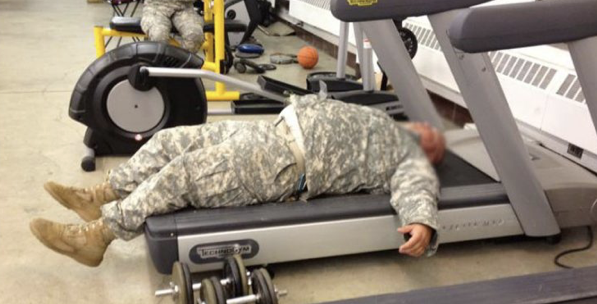
By Anna Woodring, MTI Strength & Conditioning Coach
As a USMC Captain myself, I negatively judge other officers who do not look athletically fit. When a new Captain steps on deck, I size him up. If he looks out of shape, he gets a black mark in my book.
But there are exceptions where unit professionals ultimately gained my respect because of their knowledge and leadership.
I have encountered Master Gunnery Sergeants who struggled to maintain a passing PFT. They did not prioritize physical fitness and approached training sessions with minimal effort. However, once physical training was over, I wanted to be on their team. They possessed rare proficiency in understanding the intricacies of any system. They saved my ass numerous times by providing valuable insights on what would work and what would not. They had the ability to guide individuals who were merely full of “good ideas” to effectively executing operational change and improvement..
Experience plays a crucial role in leading. Leaders who have been through various situations possess insightful lessons learned. They are often logistical geniuses and know the right person to contact regardless of the situation. Experience allows professionals to navigate complex situations, make informed decisions, and anticipate potential challenges that junior guys lack.
Downrange fitness is often emphasized as being of utmost importance. The capability to ensure the safety of myself and my team members becomes crucial. Being tactically proficient is equally important.
One fellow officer whom I initially disregarded, but earned my respect quickly during field operations, displayed exceptional tactical proficiency. This individual outperformed us when it came to teaching building clearing and demonstrating maneuver tactics to his fellow Marines. Furthermore, he achieved a perfect score on live fire drills and took the time to assist those who were struggling. He brought essential skills and a high level of instruction to the unit, that I could not provide. His tactical proficiency made up for his lack of fitness.
I recently completed my MS in exercise science and as part of that served as a graduate assistant strength and conditioning coach for a D1 football team. There I found most collegiate strength coaches very fit. College football players respond well to coaches who can demonstrate and perform the exercises they expect the players to do. In fact I have witness players flat out refuse to comply until they see the coach demonstrate the exercise.
However, there was one coach in the weightroom, who, while strong, was overall unfit. However, the players responded positively to him because he made an effort to truly get to know each of them. Many of the players saw him as a parental figure and worked hard not to disappoint him.
Is it fair to judge a tactical or fitness professional negatively if he or she is unfit? Regardless of fairness, the reality is that initial impressions hold significant weight, particularly in athletic and tactical environments.
However, it is crucial to acknowledge that respect and job performance is not solely determined by fitness. As well, a high level of physical fitness in these occupations does signal a great leader. I have witnessed many physically fit individuals who were ineffective leaders.
Unfit leaders may face biases, but if they possess qualities that make them indispensable team members, respect is always given.
